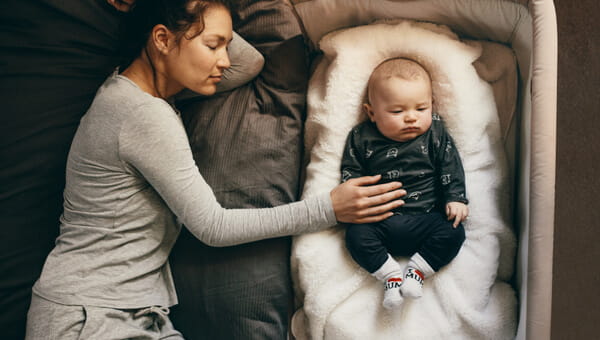Co-Sleeping
Doctors’ recommendations on co-sleeping
The American Academy of Pediatrics recommends that babies share a room with their mothers for at least the first six months of life, but that they sleep in their own crib or bassinet. Sharing a bed is never recommended for babies, because it increases the risk of injury or death. For example, a baby sleeping in the parents’ bed is more likely to:
- suffocate, due to pillows, blankets, etc.
- be injured due to a parent rolling over on them
- be strangled in a bedsheet or a parent’s clothing
- fall off of the bed onto the floor
- be caught between the mattress and the headboard
- become a victim of sudden infant death syndrome (SIDS)
What are some safer options?
It can make it easier for both of you to sleep if you can keep your baby close. If possible, keep the crib right next to your bed, so that you can reach out and touch your baby if he or she cries. You can also look into infant co-sleepers, which are kind of like bassinets that attach to your bed. These allow your baby to be right next to you, but still in their own safe sleeping space.
It's okay to bring your baby into your bed to feed or just for comfort, but you need to be sure to put them back into their own bed before you fall asleep.
For more information about infant safe sleeping, listen to our selected podcast.

What You Need to Know About Infant Safe Sleeping and Co-Sleeping
Since the American Academy of Pediatrics (AAP) recommended all babies should be placed on their backs to sleep in 1992, deaths from Sudden Infant Death Syndrome have declined dramatically. But sleep-related deaths from other causes, including suffocation, entrapment and asphyxia, have increased.Sleep needs for babies vary depending on their age. Even though you may think it will be easier for feedings or to get up in the middle of the night if your baby is co-sleeping with you, the AAP strongly believes in sharing your room and not your bed. Putting your baby in bed with you may raise the risk of strangulation, suffocation, entrapment, and SIDS. Monica Kharbanda, MD, discusses the potential dangers of co-sleeping, why you should put your baby to sleep on their backs, and the latest recommendations from the American Academy of Pediatrics.Learn more about BayCare’s children’s health services.This podcast is for informational purposes only, and is not intended to be a substitute for professional medical advice, diagnosis, or treatment. This podcast does not create a physician-patient relationship. You should always consult your physician or other healthcare professional with any questions you may have regarding a medical condition. If you think you may have a medical emergency, call your physician or 911 immediately.




